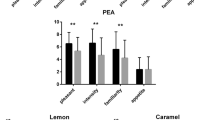Abstract
Chemical senses such as odor, taste and appearance are directly related with appetite. Understanding the relation between appetite and flavor is getting more important due to increasing number of obese patients worldwide. The literature on the studies investigating the change in olfactory abilities and gustatory sensitivity mostly performed using food-related odors and tastes rather than standardized tests were developed to study olfaction and gustation. Therefore, results are inconsistent and the relationship between olfactory and gustatory sensitivity with respect to the actual state of human satiety is still not completely understood. Here, for the first time in literature, we investigated the change in both olfactory abilities and gustatory sensitivity in hunger and in satiety using 123 subjects (37 men, 86 women; mean age 31.4 years, age range 21–41 years). The standardized Sniffin’ Sticks Extended Test and Taste Strips were used for olfactory testing and gustatory sensitivity, respectively. TDI score (range 1–48) was calculated as the collective scores of odor threshold (T), odor discrimination (D) and odor identification (I). The evaluation was performed in two successive days where the hunger state of test subjects was confirmed by blood glucose test strips (mean blood glucose level 90.0 ± 5.6 mg/dl in hunger and 131.4 ± 8.1 mg/dl in satiety). The results indicated statistically significant decrease in olfaction in satiety compared to hunger (mean TDI 39.3 ± 1.1 in hunger, 37.4 ± 1.1 in satiety, p < 0.001). The comparison of gustatory sensitivity indicated significantly higher sensitivity to sweet, sour and salty in hunger (p < 0.001), but significantly higher sensitivity to bitter tastant in satiety (p < 0.001). With this prospective study, we were able to show that both olfactory abilities and gustatory sensitivity were affected by hunger state.

Similar content being viewed by others
References
Haase L, Cerf-Ducastel B, Murphy C (2009) Cortical activation in response to pure taste stimuli during the physiological states of hunger and satiety. Neuroimage 44:1008–1021. doi:10.1016/j.neuroimage.2008.09.044
Rolls ET, Rolls JH (1997) Olfactory sensory-specific satiety in humans. Physiol Behav 61:461–473
Yeomans MR (2006) Olfactory influences on appetite and satiety in humans. Physiol Behav 87:800–804
Ramaekers MG, Boesveldt S, Gort G, Lakemond CM, van Boekel MA, Luning PA (2014) Sensory-specific appetite is affected by actively smelled food odors and remains stable over time in normal-weight women. J Nutr 144:1314–1319. doi:10.3945/jn.114.192567
Aimé P, Duchamp-Viret P, Chaput MA, Savigner A, Mahfouz M, Julliard AK (2007) Fasting increases and satiation decreases olfactory detection for a neutral odor in rats. Behav Brain Res 179:258–264. doi:10.1016/j.bbr.2007.02.012
Palouzier-Paulignan B, Lacroix MC, Aimé P, Baly C, Caillol M, Congar P, Julliard AK, Tucker K, Fadool DA (2012) Olfaction under metabolic influences. Chem Senses 37:769–797. doi:10.1093/chemse/bjs059
Duclaux R, Feisthauer J, Cabanac M (1973) Effects of a meal on the pleasantness of food and nonfood odors in man. Physiol Behav 10:1029–1033
van Rijn I, de Graaf C, Smeets PA (2015) Tasting calories differentially affects brain activation during hunger and satiety. Behav Brain Res 279:139–147. doi:10.1016/j.bbr.2014.11.019
Rolls ET (2012) Taste, olfactory and food texture reward processing in the brain and the control of appetite. Proc Nutr Soc 71:488–501. doi:10.1017/S0029665112000821
Haehner A, Mayer AM, Landis BN, Pournaras I, Lill K, Gudziol V, Hummel T (2009) High test-retest reliability of the extended version of the “Sniffin’ Sticks” test. Chem Senses 34:705–711. doi:10.1093/chemse/bjp057
Hummel T, Sekinger B, Wolf S, Pauli E, Kobal G (1997) ‘Sniffin’ Sticks’: olfactory performance assessed by the combined testing of odor identification, odor discrimination and olfactory threshold. Chem Senses 22:39–52
Mueller C, Kallert S, Renner B, Stiassny K, Temmel AF, Hummel T, Kobal G (2003) Quantitative assessment of gustatory function in a clinical context using impregnated “taste strips”. Rhinology 41:2–6
Pasquet P, Monneuse MO, Simmen B, Marez A, Hladik CM (2006) Relationship between taste thresholds and hunger under debate. Appetite 46:63–66
Stafford LD, Welbeck K (2011) High hunger state increases olfactory sensitivity to neutral but not food odors. Chem Senses 36:189–198. doi:10.1093/chemse/bjq114
Schreder T, Albrecht J, Kleemann AM, Schöpf V, Kopietz R, Anzinger A, Demmel M, Linn J, Pollatos O, Wiesmann M (2008) Olfactory performance of patients with anorexia nervosa and healthy subjects in hunger and satiety. Rhinology 46:175–183
Albrecht J, Schreder T, Kleemann AM, Schopf V, Kopietz R, Anzinger A, Demmel M, Linn J, Kettenmann B, Wiesmann M (2009) Olfactory detection thresholds and pleasantness of a food-related and a non-food odour in hunger and satiety. Rhinology 47:160–165
Pangborn RM (1959) Influence of hunger on sweetness preferences and taste thresholds. Am J Clin Nutr 7:280–286
Zverev YP (2004) Effects of caloric deprivation and satiety on sensitivity of the gustatory system. BMC Neurosci 5:5
Haase L, Green E, Murphy C (2011) Males and females show differential brain activation to taste when hungry and sated in gustatory and reward areas. Appetite 57:421–434. doi:10.1016/j.appet.2011.06.009
Pollatos O, Kopietz R, Linn J, Albrecht J, Sakar V, Anzinger A, Schandry R, Wiesmann M (2007) Emotional stimulation alters olfactory sensitivity and odor judgment. Chem Senses 32:583–589
Plata-Salamán CR (1991) Regulation of hunger and satiety in man. Dig Dis 9:253–268
Solemdal K, Sandvik L, Willumsen T, Mowe M (2014) Taste ability in hospitalised older people compared with healthy, age-matched controls. Gerodontology 31:42–48. doi:10.1111/ger.12001
Laeng B, Berridge KC, Butter CM (1993) Pleasantness of a sweet taste during hunger and satiety: effects of gender and “sweet tooth”. Appetite 21:247–254
Conflict of interest
The authors declare that they have no conflict of interest.
Ethical approval
All procedures performed in studies involving human participants were in accordance with the ethical standards of the institutional and/or national research committee and with the 1964 Helsinki declaration and its later amendments or comparable ethical standards.
Informed consent
Informed consent was obtained from all individual participants included in the study.
Author information
Authors and Affiliations
Corresponding author
Rights and permissions
About this article
Cite this article
Hanci, D., Altun, H. Hunger state affects both olfactory abilities and gustatory sensitivity. Eur Arch Otorhinolaryngol 273, 1637–1641 (2016). https://doi.org/10.1007/s00405-015-3589-6
Received:
Accepted:
Published:
Issue Date:
DOI: https://doi.org/10.1007/s00405-015-3589-6




